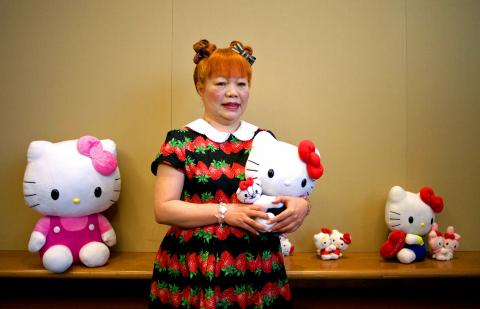The flamboyant designer of Japanese cartoon and global mega-brand Hello Kitty defended the cute cat against new rivals yesterday as the character prepares to celebrate her 40th birthday.
Speaking on the sidelines of the Hong Kong Book Fair, Yuko Yamaguchi took the concept of life imitating art to another level, wearing a Kitty-style strawberry dress with dyed auburn hair piled into two buns topped with a red ribbon — the cat’s signature accessory.
As Kitty enters her next decade, she faces increasing competition from more cutting-edge cartoons like Brown and Cony, the bear and rabbit mascots of Tokyo-based messaging app Line, which has taken Asia by storm in recent months. However, Yamaguchi insisted Kitty would cope with growing older in a digital age.

Photo: AFP
“There are new cartoon characters that are coming out daily... [but] I think Hello Kitty is the only one that can adapt to the changes in the world,” Yamaguchi said.
The moon-faced mouthless white cat first appeared in 1974 on a coin purse in Japan and has since built up a worldwide fan base, appearing on everything from handbags to sex toys.
Her image is licensed by Japanese company Sanrio, which says on its Web site that it makes more than US$5 billion in retail sales each year. Hello Kitty is its flagship brand. Yamaguchi, who was at the Hong Kong fair to tie in with its new Japan Pavilion, has been the lead designer of Hello Kitty since 1980 and promotes herself as the character’s best friend.
“She is very motivated and open and wants to face the future,” she says of the character.
There are plenty of detractors of Hello Kitty’s sweetness — entire blogs are dedicated to tearing down the cute icon, with online spoofs depicting her as a horror movie character.
However, Yamaguchi said her appeal can endure.
“There are already three generations of fans that like Hello Kitty, so I hope that there will be more fans like that in the future, like people in a family loving Hello Kitty together,” she said.
The main Hello Kitty 40th birthday celebrations will take place later this year, including the first ever fan convention, which is to be hosted in Los Angeles at the end of October.

Sweeping policy changes under US Secretary of Health and Human Services Robert F. Kennedy Jr are having a chilling effect on vaccine makers as anti-vaccine rhetoric has turned into concrete changes in inoculation schedules and recommendations, investors and executives said. The administration of US President Donald Trump has in the past year upended vaccine recommendations, with the country last month ending its longstanding guidance that all children receive inoculations against flu, hepatitis A and other diseases. The unprecedented changes have led to diminished vaccine usage, hurt the investment case for some biotechs, and created a drag that would likely dent revenues and

Global semiconductor stocks advanced yesterday, as comments by Nvidia Corp chief executive officer Jensen Huang (黃仁勳) at Davos, Switzerland, helped reinforce investor enthusiasm for artificial intelligence (AI). Samsung Electronics Co gained as much as 5 percent to an all-time high, helping drive South Korea’s benchmark KOSPI above 5,000 for the first time. That came after the Philadelphia Semiconductor Index rose more than 3 percent to a fresh record on Wednesday, with a boost from Nvidia. The gains came amid broad risk-on trade after US President Donald Trump withdrew his threat of tariffs on some European nations over backing for Greenland. Huang further

CULPRITS: Factors that affected the slip included falling global crude oil prices, wait-and-see consumer attitudes due to US tariffs and a different Lunar New Year holiday schedule Taiwan’s retail sales ended a nine-year growth streak last year, slipping 0.2 percent from a year earlier as uncertainty over US tariff policies affected demand for durable goods, data released on Friday by the Ministry of Economic Affairs showed. Last year’s retail sales totaled NT$4.84 trillion (US$153.27 billion), down about NT$9.5 billion, or 0.2 percent, from 2024. Despite the decline, the figure was still the second-highest annual sales total on record. Ministry statistics department deputy head Chen Yu-fang (陳玉芳) said sales of cars, motorcycles and related products, which accounted for 17.4 percent of total retail rales last year, fell NT$68.1 billion, or

MediaTek Inc (聯發科) shares yesterday notched their best two-day rally on record, as investors flock to the Taiwanese chip designer on excitement over its tie-up with Google. The Taipei-listed stock jumped 8.59 percent, capping a two-session surge of 19 percent and closing at a fresh all-time high of NT$1,770. That extended a two-month rally on growing awareness of MediaTek’s work on Google’s tensor processing units (TPUs), which are chips used in artificial intelligence (AI) applications. It also highlights how fund managers faced with single-stock limits on their holding of market titan Taiwan Semiconductor Manufacturing Co (TSMC, 台積電) are diversifying into other AI-related firms.